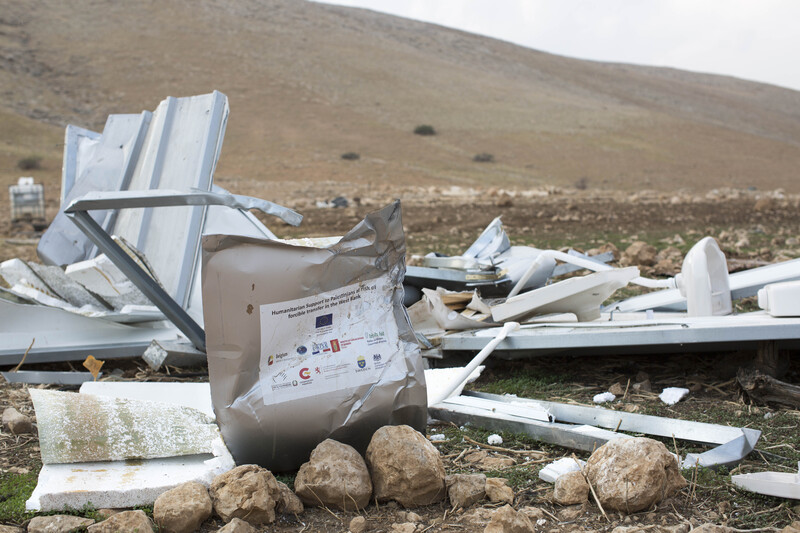Israel destroys and steals $2 million worth of EU aid
Rights and Accountability 16 December 2020

Israel has repeatedly destroyed aid projects financed by the European Union.
ActiveStillsImagine that you had neighbors who were constantly stealing your belongings or damaging your property.
How would you respond? By inviting those neighbors to a party? By celebrating how they have the same “values” as you?
Israel is an abusive neighbor for the European Union.
Through a freedom of information request, I learned that Israel has caused destruction worth more than $2 million to EU aid projects in the occupied West Bank over the past five years.
Yet rather than taking any action against Israel, EU representatives regularly sip champagne with and shower gifts on their abusive neighbor.
A note drawn up by the European Commission states that Israel has “demolished or seized” almost 560 “structures” within aid projects since 2015. The projects were financed by the EU collectively and by its governments individually.
More than 70 of those structures were destroyed or confiscated between January and October this year, according to the note.
It would be wrong to remain dispassionate while examining these figures.
The EU has been adding up the amount of damage inflicted on its aid projects by Israel for the past two decades. The accounting exercises have not been followed up with action.
Complicated?
Next month will mark the 20th anniversary of a threat that has proven idle. In January 2002, EU foreign ministers issued a statement that they “reserve[d] the right to claim reparation” from Israel “in the appropriate fora.”
Soon after that warning was made, it was effectively withdrawn. Chris Patten, then the EU’s external relations commissioner, said barely two months later that starting legal proceedings against Israel would be “horrendously complicated.”
His claim was based on the understanding that the EU no longer owns aid projects it funds once the relevant checks are signed. Filing a lawsuit would, therefore, be a matter for aid recipients.
Contrary to Patten’s argument, the issues involved are not at all complicated.
If the EU will not do anything itself, its lawyers can advise the aid recipients or administrators – who include Palestinian communities and international charities active in the West Bank and Gaza – on how to sue Israel.
Other possibilities would be to give Israel less money or, better still, no money at all.
Israel is a major beneficiary of EU subsidies. The EU has awarded nearly $1.4 billion to Israeli firms and institutions under Horizon 2020, a multiannual scheme for scientific research.
Reducing Israel’s subsidies as a penalty for the destruction of aid projects would not be too arduous a task.
While all of the subsidies that the EU gives to Israel should be opposed, some are completely indefensible. Mekorot, a state-owned water company, benefits from Horizon 2020, even though it appears on a United Nations blacklist of firms active in Israel’s illegal settlements.
No appetite for accountability
The essential problem is that there is no real appetite for holding Israel accountable among either the Brussels bureaucracy or among EU governments.
Belgium has tried to present itself as particularly upset by Israel’s destructive conduct over the past few years. Just last month, Belgium complained that four Palestinian homes it had funded near the West Bank city of Hebron were demolished by Israel.
The Belgians timidly asked Israel for compensation. Timid appeals are completely useless when dealing with a brutal occupier.
The destruction is taking place within a wider context of Israeli racism toward the Palestinians. It is part of a bigger picture whereby Palestinians are being treated with extreme cruelty because – as far as Israel is concerned – they belong to the “wrong” ethnicity.
Those who speak frankly about Israel’s apartheid policies run the risk of being smeared.
On Monday, Germany, which holds the EU’s rotating presidency, jointly hosted an online conference titled “Together against anti-Semitism” with Israel’s embassy in Brussels.
Participants in the event recommended that governments adopt the definition of anti-Semitism approved by the International Holocaust Remembrance Alliance. That definition has been deliberately phrased in such a way that anyone who describes Israel as racist may be accused of hating Jews.
Speakers at this week’s conference included Felix Klein and Katharina von Schnurbein, nominally the coordinators against anti-Semitism for Germany and the EU. Both have alleged that comparing Israel to apartheid South Africa amounts to anti-Jewish bigotry.
The conference provided a sordid example of how the EU is muzzling free speech at Israel’s behest.
When such an agenda is being pursued, it is little wonder that Israel can keep on pounding aid projects with a wrecking ball.
Continue
No comments:
Post a Comment